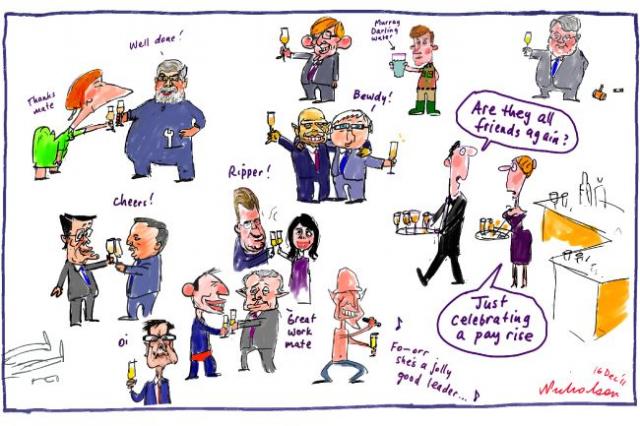Search
Democracy Links
Member's Off-site Blogs
in the spirit of self-sacrifice .....

Gary Gray brandished a parliamentary gold pass at his press conference yesterday and declared it would soon be a ''museum piece''.
It was a neat theatrical touch from the Special Minister of State because the pass is the key ingredient in public abhorrence of the perks and privileges perceived to be accruing to members of parliament.
The minister knew only too well that this morning's headlines would focus on the Remuneration Tribunal's recommendation of 31 per cent pay rises for Julia Gillard and Tony Abbott, and even bigger increases awarded to shadow ministers.
He knew that criticism would rain down on the $44,090 increase in a backbencher's salary. Many will question whether their local MP should be paid $185,000, a salary more than three times average earnings.
Politicians don't deserve any more consideration for their employment than others. Indeed, they hold positions that could be filled many times over by people willing to do it for much less. But they are entitled to be accorded the same right as other people whose perquisites are adjudicated and determined by assorted tribunals.
In this case, the Remuneration Tribunal has opted for the lowest levels of salary as recommended by an independent review. They weren't prepared to countenance a backbencher on $250,000. Often forgotten is that MPs would now be earning closer to that amount if determination of their salaries had been put in independent hands decades ago.
Recommended salary increases have often been forgone over the years as governments cowered to the backlash so often whipped up by the media and replaced them with a distorted and opaque system of non-salary benefits.
We should welcome yesterday's abolition of the gold pass, cutbacks in entitlements for current holders and reductions in travel perks and other benefits, as providing transparency in association with the salary increase.
I don't subscribe to the argument that ''if you pay peanuts, you get monkeys''. But there are sound reasons to pay MPs well and to narrow the gap between ministerial salaries and those of the public servants who earn more than the politicians to whom they answer.
Moreover, a political career should be esteemed and valued in a democracy. Whatever we may think of individual politicians from time to time, especially the ones we didn't vote for, the willingness to contribute to the civic life of the nation warrants respect.
What politicians do is different from other forms of employment. Asked whether the life of a politician is 24/7, Gray went further yesterday, depicting it as 24/7/52, ''more than a full-time job''. Anyone who has ever counted a member of parliament among their friends knows this to be true. Their time is no longer their own in a way that most people would find unbearable.
In so many ways, MPs function as emergency social workers, dealing with myriad problems on a daily basis. Weekends and weekday nights consumed by electorate events is their lot in life. Schools, clubs, business organisations, local councils, sports groups - the list is endless, the button-holing continuous, the demands for assistance non-stop.
It's true that there are no set hours of work for MPs, and no mandatory tasks, aside from attending parliamentary sittings. Their roles vary, depending on geography and electoral margins of safety, but the evidence suggests all MPs are inundated as never before, in part because of digital technology that makes them accessible, and in part because of a growing culture of entitlement.
Yes, no one made them do it, and the truth is many politicians get a huge buzz out of it; the ego is stroked, the sense of being at the centre of things can be intoxicating.
But the reality also is that most politicians find they have little real power. For many, their influence exists through their skill as a political traffic cop, directing people to the right department, the correct branch of government or the appropriate public servant who can sort out their problem.
On average, political careers are now shorter than ever before. The electoral climate is more volatile as party identification declines. Over the past 20 years, half of all the seats in the House of Representatives have changed hands at least once. Politicians who may have forgone other careers can quickly find themselves back in the job market. Their salaries should appropriately account for this dislocation.
Like any profession, politicians have their bad apples. Some are lazy and some are hacks who do little of value. Reputational damage stems from the venal behaviour of a Mal Colston, or the full-throated expenses claims of a Peter Slipper. But we put them there. To paraphrase the Prime Minister, ''they are us''.
The government and the Remuneration Tribunal should be congratulated on their attempt to lance the electoral boil of parliamentary entitlements.
http://www.smh.com.au/opinion/politics/a-lot-to-account-for-in-politicians-pay-20111215-1owtr.html
- By John Richardson at 16 Dec 2011 - 10:50am
- John Richardson's blog
- Login or register to post comments
Recent comments
3 hours 10 min ago
3 hours 18 min ago
3 hours 23 min ago
7 hours 1 min ago
10 hours 57 min ago
15 hours 44 min ago
23 hours 57 min ago
1 day 5 hours ago
1 day 6 hours ago
1 day 6 hours ago